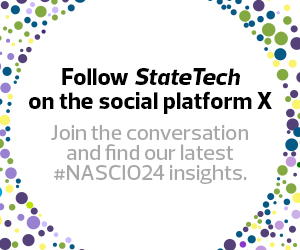When I took this job in March 2021, we believed there were about 266,000 households in North Carolina that lacked access to the internet. We believed there were about 1.3 million households in the state that had difficulty paying for internet access. I recall that we had 430,000 households that didn't have a laptop or desktop in their home. Of that 430,000, about 180,000 didn't have a smartphone. And then there were about 1.2 million North Carolinians that did not have adequate digital literacy skills.
Today, we have over 901,000 households that have benefited from the Affordable Connectivity program. We are very confident that we hit our 80% goal for broadband subscriptions. We built our initiatives with American Rescue Plan Act funds. We addressed infrastructure, affordability and digital literacy. What's going to make these efforts successful is that we're targeting the grassroots level. We're in the communities, we're in the anchor institutions, and we have engaged community leaders on these problems. We also have turned to our GIS programs and overlay data sets, which allow us to drill into a community and take a look at opportunities for investment to build infrastructure.
STATETECH: At the last few NASCIO conferences, there has been no bigger buzzword than artificial intelligence. Where is North Carolina with respect to adopting AI?
WEAVER: I grimace a little bit when I hear the term AI because candidly we've been doing artificial intelligence for some time. AI has been around for 30 or 40 years. We have reaped the benefits from it. Now, in North Carolina, we are examining generative AI and the nuances involved. We've been encouraging a risk-based approach. We're more concerned about publicly available generative AI than the GenAI we can bring into our four walls. And so, we're really taking a hard look at our data. Do we have good data discovery in place? Do we have good data governance? Do we have the data classification that we need? We must ensure that we are taking a risk-based approach to this.
Our initial focus with generative AI is on back-office processes. We are learning the tools and the technology and how to do it in a manner that benefits us. We are improving our overall procurement process and accounts payable and accounts receivable. We are saving workforce hours in those areas and deploying people to more pressing needs. As we get more comfortable, we will move closer to using GenAI for citizen services.
STATETECH: Speaking of NASCIO, what are you looking forward to at this year's conference?
WEAVER: The NASCIO Top 10 list is developed by the state CIOs. My colleagues and I weigh in on the list. I joke that broadband shows up at No. 7 because I voted seven times. Our governor has made it very clear that it's our No. 1 priority.
NASCIO is a phenomenal organization. Over the summer, we had a meeting in Milwaukee — our CIO Leadership Forum. We established an emerging leader program, and every state CIO was asked to select an individual to participate in the program. The feedback in response to that has been truly rewarding. Participants in the program gain a better understanding of the challenges we face as CIOs. But one thing that really stood out for me was that people do not realize how much of a family we are.
DISCOVER: State CIOs can maximize effective citizen services by considering inclusiveness.
It doesn't matter what state you're in. You're dealing with the Top 10 issues identified on our NASCIO priorities list. Each of us might prioritize them in a different order, but we are all working on them. And so, at NASCIO, we sit down to talk to our colleagues about what they've been able to do to improve digital services and the overall digital government experience. And we talk about cybersecurity issues and other important topics.
From Alaska to Florida, from Maine to California and our territories, this is an association focused on the needs of the membership. This year, we will continue the conversation on artificial intelligence, talking about the technology, talking about data, talking about security, talking about risk. You'll also see the new report from NASCIO in collaboration with EY on data, data quality and data management, as well as our report from Deloitte on cybersecurity, which we publish biennially. And we are going to have more conversations about workforce concerns and how we develop our talent pipeline.
Keep this page bookmarked for our coverage of the NASCIO 2024 Annual conference. Follow us on X, formerly known as Twitter, at @StateTech and the official conference Twitter account, @NASCIO. Join the conversation using the hashtag #NASCIO24.












